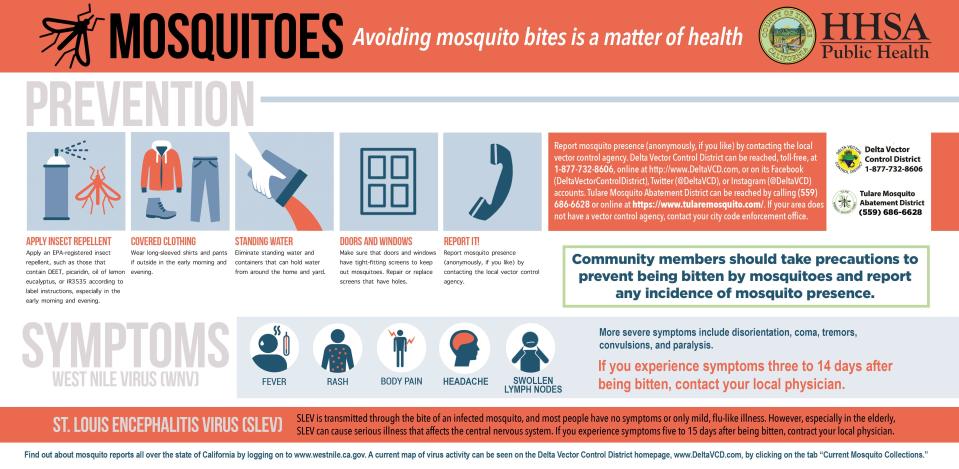Human case of West Nile virus reported in Tulare County
A human case of West Nile virus was recently reported in Tulare County, according to the county's public health department.
In light of the recent report, local health officials want to remind residents of the dangers of West Nile and St. Louis Encephalitis viruses and how to protect themselves against infection.
“Due to this increased activity and this reported case, we strongly encourage residents to use safeguards to reduce their risk of contracting both West Nile virus and (St. Louis Encephalitis virus) through mosquito bites,” stated Tulare County Deputy Public Health Officer Dr. Thomas Overton.
Mosquito samples have tested positive for West Nile virus and St. Louis Encephalitis viruses in multiple locations within Tulare County. There were 89 new West Nile-positive mosquito samples reported in the county last week, according to California Department of Public Health.
This year in California, 533 mosquito samples from 19 counties have tested positive for the virus, according to the state's public health department. More than 7,500 human cases and over 300 deaths have been reported in California since 2003.

What to know about the viruses
West Nile virus is transmitted to humans by mosquitoes, and there is no vaccine or medication to treat the virus, according to the Centers for Disease Control and Prevention.
Most infected with West Nile will have no symptoms; however, about one in five people will develop a fever with other symptoms from two to 14 days after infection. Severe cases of West Nile virus can affect the central nervous system and result in death or long-term disability.
The two viruses are similar and are transmitted by the same types of mosquitoes, according to the Centers for Disease Control and Prevention.
Most people infected with St. Louis Encephalitis virus will have few to no symptoms. The most common symptoms are mild, flu-like symptoms, including fever and headache, from five to 15 days after infection.
Like the West Nile virus, severe cases of St. Louis Encephalitis can affect the central nervous system, resulting in meningitis, encephalitis, death, or long-term disability.
Here's how you can stop the spread of West Nile
Be on the lookout for unoccupied homes since they may have swimming pools or backyard ponds that are breeding grounds for mosquitoes.
To avoid being bitten, residents should take the following precautions:
Use EPA-registered insect repellent such as DEET. Always follow label instructions carefully.
Dress in long sleeves and pants during dawn and dusk or in areas where mosquitoes are active.
Drain standing water that may produce mosquitoes.
Repair or replace door and window screens that have tears or holes.
Residents also should contact their local mosquito abatement district if they see areas of standing water that may be breeding areas for mosquitoes.
Delta Vector Control (Mosquito Abatement District) – Covering the northern portion of Tulare County. Contact the Visalia Office at (559) 732-8606 or visit online at: http://www.deltavcd.com/.
Tulare Mosquito Abatement District – Covering the western portion of Tulare County. Contact the Tulare Office at (559) 686-6628 or visit online at: https://www.tularemosquito.com/.
Delano Mosquito Abatement District – Covering the southern portion of Tulare County. Contact the Delano Office at (661) 725-3114 or visit online at: https://delanomosquito.com/.
Horses are also susceptible to West Nile virus, but there is a vaccine for horses. Horse owners should have their horses vaccinated annually and keep vaccinations up to date, public health officials suggest.
This article originally appeared on Victorville Daily Press: Here's what you need to know about West Nile virus prevention

